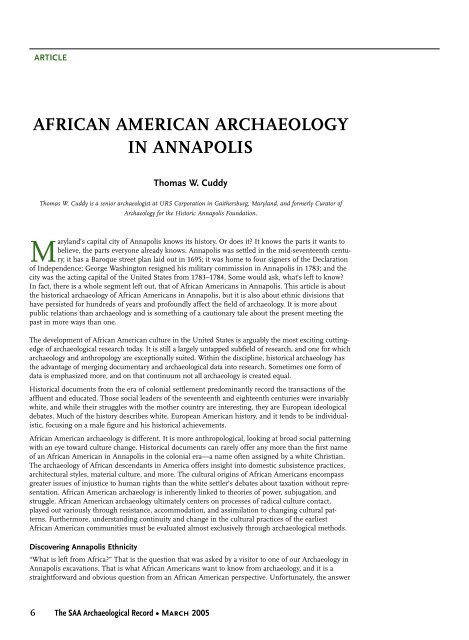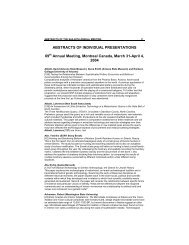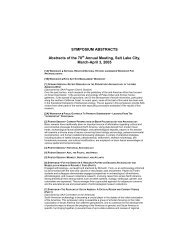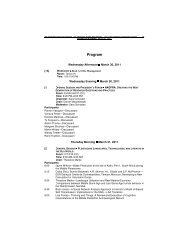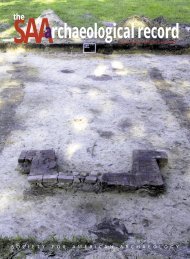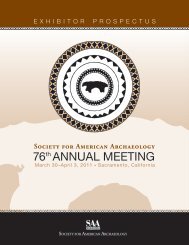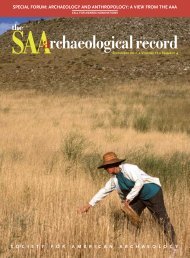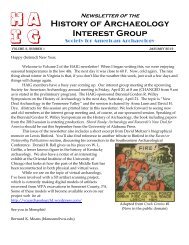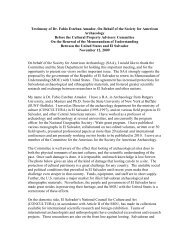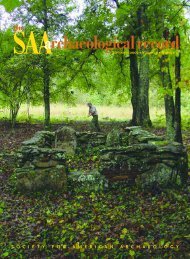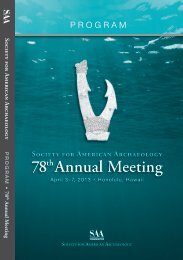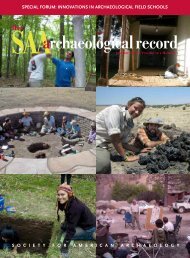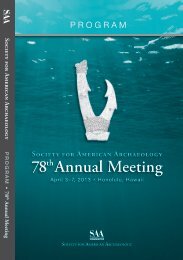The Public Meaning of Archaeological Heritage - Society for ...
The Public Meaning of Archaeological Heritage - Society for ...
The Public Meaning of Archaeological Heritage - Society for ...
You also want an ePaper? Increase the reach of your titles
YUMPU automatically turns print PDFs into web optimized ePapers that Google loves.
ARTICLE<br />
AFRICAN AMERICAN ARCHAEOLOGY<br />
IN ANNAPOLIS<br />
Thomas W. Cuddy<br />
Thomas W. Cuddy is a senior archaeologist at URS Corporation in Gaithersburg, Maryland, and <strong>for</strong>merly Curator <strong>of</strong><br />
Archaeology <strong>for</strong> the Historic Annapolis Foundation.<br />
Maryland’s capital city <strong>of</strong> Annapolis knows its history. Or does it? It knows the parts it wants to<br />
believe, the parts everyone already knows. Annapolis was settled in the mid-seventeenth century;<br />
it has a Baroque street plan laid out in 1695; it was home to four signers <strong>of</strong> the Declaration<br />
<strong>of</strong> Independence; George Washington resigned his military commission in Annapolis in 1783; and the<br />
city was the acting capital <strong>of</strong> the United States from 1783–1784. Some would ask, what’s left to know?<br />
In fact, there is a whole segment left out, that <strong>of</strong> African Americans in Annapolis. This article is about<br />
the historical archaeology <strong>of</strong> African Americans in Annapolis, but it is also about ethnic divisions that<br />
have persisted <strong>for</strong> hundreds <strong>of</strong> years and pr<strong>of</strong>oundly affect the field <strong>of</strong> archaeology. It is more about<br />
public relations than archaeology and is something <strong>of</strong> a cautionary tale about the present meeting the<br />
past in more ways than one.<br />
<strong>The</strong> development <strong>of</strong> African American culture in the United States is arguably the most exciting cuttingedge<br />
<strong>of</strong> archaeological research today. It is still a largely untapped subfield <strong>of</strong> research, and one <strong>for</strong> which<br />
archaeology and anthropology are exceptionally suited. Within the discipline, historical archaeology has<br />
the advantage <strong>of</strong> merging documentary and archaeological data into research. Sometimes one <strong>for</strong>m <strong>of</strong><br />
data is emphasized more, and on that continuum not all archaeology is created equal.<br />
Historical documents from the era <strong>of</strong> colonial settlement predominantly record the transactions <strong>of</strong> the<br />
affluent and educated. Those social leaders <strong>of</strong> the seventeenth and eighteenth centuries were invariably<br />
white, and while their struggles with the mother country are interesting, they are European ideological<br />
debates. Much <strong>of</strong> the history describes white, European American history, and it tends to be individualistic,<br />
focusing on a male figure and his historical achievements.<br />
African American archaeology is different. It is more anthropological, looking at broad social patterning<br />
with an eye toward culture change. Historical documents can rarely <strong>of</strong>fer any more than the first name<br />
<strong>of</strong> an African American in Annapolis in the colonial era—a name <strong>of</strong>ten assigned by a white Christian.<br />
<strong>The</strong> archaeology <strong>of</strong> African descendants in America <strong>of</strong>fers insight into domestic subsistence practices,<br />
architectural styles, material culture, and more. <strong>The</strong> cultural origins <strong>of</strong> African Americans encompass<br />
greater issues <strong>of</strong> injustice to human rights than the white settler’s debates about taxation without representation.<br />
African American archaeology is inherently linked to theories <strong>of</strong> power, subjugation, and<br />
struggle. African American archaeology ultimately centers on processes <strong>of</strong> radical culture contact,<br />
played out variously through resistance, accommodation, and assimilation to changing cultural patterns.<br />
Furthermore, understanding continuity and change in the cultural practices <strong>of</strong> the earliest<br />
African American communities must be evaluated almost exclusively through archaeological methods.<br />
Discovering Annapolis Ethnicity<br />
“What is left from Africa?” That is the question that was asked by a visitor to one <strong>of</strong> our Archaeology in<br />
Annapolis excavations. That is what African Americans want to know from archaeology, and it is a<br />
straight<strong>for</strong>ward and obvious question from an African American perspective. Un<strong>for</strong>tunately, the answer<br />
6 <strong>The</strong> SAA <strong>Archaeological</strong> Record • March 2005


